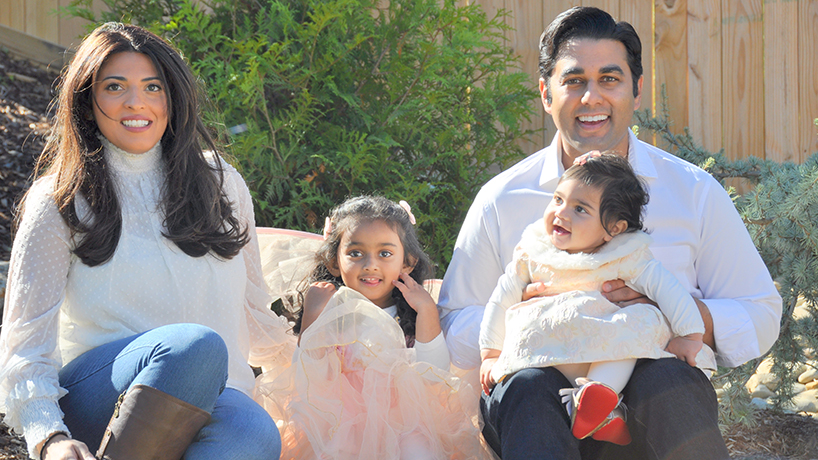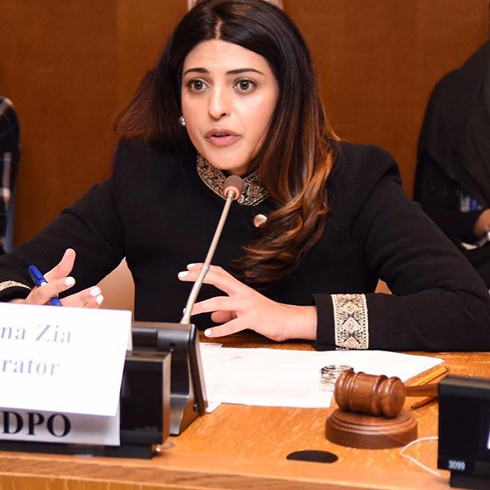
UMSL alumna Ameena Zia now lives on the East Coast with her daughters, 3-year-old Lana and 11-month-old Eva, and husband Dr. Yaseen Zia. Zia earned her political science PhD from UMSL in May. (Photos courtesy of Ameena Zia)
In 2012, Basra Noor of Ballwin, Missouri, was pulled over and arrested for an outstanding warrant for not registering her car. Despite her protests, police officers made her remove her headscarf for her mug shot and jail stay. The backlash from the local Muslim community and the St. Louis Chapter of the Council on American-Islamic Relations, an advocacy group, was immediate.
That’s where then-University of Missouri–St. Louis student Ameena Zia came in.
Zia, at the time a political science PhD candidate, happened to be a full-time employee for St. Louis County Executive Charlie Dooley, who put her in charge of spearheading what to do next.
“Immediately when he heard about it, Charlie Dooley said, ‘You know, that’s not right. We have immigrants who are coming into St. Louis. We need to have them feel welcome,’” Zia recalled. “The idea was to make sure that there was something we could do so that this doesn’t happen again.”
Zia dived into researching other cities’ policies and gathered a task force comprised of CAIR St. Louis Executive Director Faizan Syed, ACLU Program Director John Chasnoff, members of the Anti-Defamation League including Karen Aroesty, area Muslim religious leaders and representatives from the police department and correctional services. Together, they started crafting an inclusive policy considerate of safety concerns.
The group based its policy on one from Dearborn, Michigan. Persons arrested with head coverings would be offered the opportunity to take two photos: one with the head covering for public use and one without for internal use. Afterward, they would be given a paper head covering for use in the cell.
“I believe that the success of the policy was due to everyone involved desiring a lasting and substantive change,” Zia said. “The implementation of the policy demonstrated the willingness and desire of the St. Louis community to show through action that St. Louis was an inclusive society and one where people would desire to move to and could prosper.”
That’s the moment from her time as the youngest ever appointee to the St. Louis County Executive Cabinet that Zia feels proudest about in what was a meaningful period. Going to school while working full time in government required hard work and lots of flexibility from both her employer and her UMSL professors. Her life demanded further flexibility after Zia finished coursework, got married and moved to New York to start a family and career. But all that sacrifice was worth it when Zia graduated with her PhD in May.
Zia started at UMSL in 2010. The school came on her radar for its criminal justice programs, but wanting to keep her options open, Zia applied to the Department of Political Science. She met with Professor Emeritus Eduardo Silva.
“When I talked to him about my interest, he immediately responded, ‘There’s definitely a place for you. Our department would love to have you,'” she said. “It was such constructive feedback that I didn’t even think twice about any other school that I had applied to.”
At UMSL, Zia connected with Professor Emeritus Terry Jones, who fostered her interest in local politics. He encouraged her to look at what campaigns were happening at the time, which is how Zia started volunteering for Dooley. Her role quickly evolved into a full-time, paid position.
During his campaign, she focused on how to appeal to immigrants, especially the Bosnian and Hispanic communities. After he won, Zia stayed on and continued to work on immigrant integration.
Zia appreciated the support of UMSL faculty such as Jones and Curators’ Research Professor of Global Studies Emeritus Joyce Mushaben and Professor David Kimball when she was juggling school and work.
Ameena Zia speaks at the United Nations Headquarters in New York City. She is an appointed U.N. representative to the ECOSOC Civil Society Network.
“Terry Jones knew what I was doing and instead of saying, ‘No, you need to focus on school,’ he encouraged me to harness the opportunity and do both,'” Zia said. “He said, ‘You know, this is such a great experience you’re getting,’ and he was right.
“The ability to see the theories and concepts that I was studying in the classroom implemented in real-time at the county was tremendous and really allowed me to gain a more comprehensive perspective.”
Another positive experience at UMSL was taking gender politics classes with then-Associate Professor Farida Jalalzai. For her class, Zia spent three months in Pakistan doing fieldwork, interviewing Pakistani women and politicians. That study segued into Zia’s dissertation topic, and Jalalzai became one of Zia’s committee members.
For her dissertation – “Descriptive to Substantive Representation: A Study of Gender Quotas in the National Assembly of Pakistan, 2002-2018” – Zia examined how many women were getting elected and what types of bills women politicians passed to see if the presence of women in politics led to gains for women in Pakistan.
While writing her dissertation, Zia moved to the East Coast, working as an adjunct professor at Philadelphia University and at the City University of New York. Then, four years ago, a colleague invited her to an expert meeting on development at the United Nations. Zia enjoyed the experience, and when they invited her back, she accepted. Before long, she was appointed as a U.N. representative to the Economic and Social Council Civil Society Network.
“I said, ‘Sure, why not?’” Zia said. “I accepted it. I had been doing work for the NGO part of the United Nations for several years by submitting written statements and making policy recommendations, at the time when the opportunity arose. I had, also, been making oral interventions as issues were being discussed at ECOSOC under the civil society umbrella at different commissions and high-level meetings. Some of the issues that I had very passionately worked on included inclusive development of girls, women and persons with disabilities.”
One of the non-governmental organizations that Zia represents is the Family Education Services Foundation, which runs a network of education for deaf children and advocates for augmentative and alternative communication such as sign language.
It’s a meaningful subject for Zia because her elder brother is hearing impaired. His condition is part of what originally brought Zia’s family from Pakistan to the U.S. and to St. Louis, where her brother studied at St. Joseph’s School for the Deaf in St. Louis County.
Making sure that children around the world have access to quality resources, as her brother did, is part of what pushed Zia to this field. That’s something she sees herself working on long-term as well as returning to teaching.
“My teaching philosophy in the university classroom is centered on the pedagogy of experiential education,” she said. “I share my work experience in the classroom and encourage students to explore real-time opportunities of learning as part of the course syllabus.
“I am a firm believer of immersing learners in active conceptual processes. It encourages reflection about the experience and helps develop new skills, new attitudes and most importantly, new ways of thinking. I, myself, was exposed to this learning method from a young age, and I am a product of it.”















